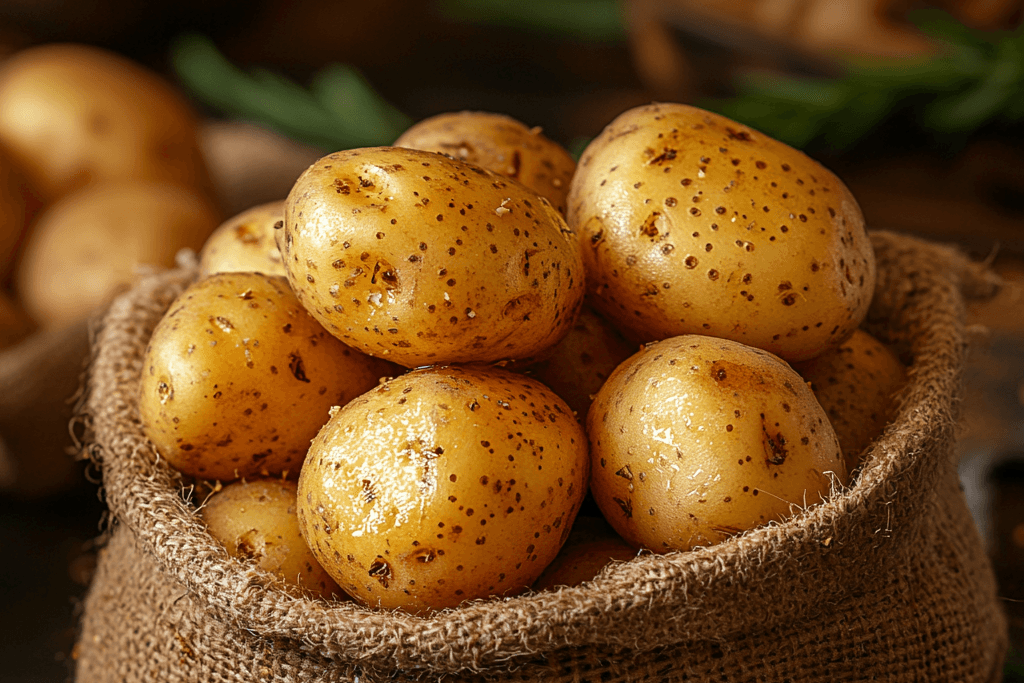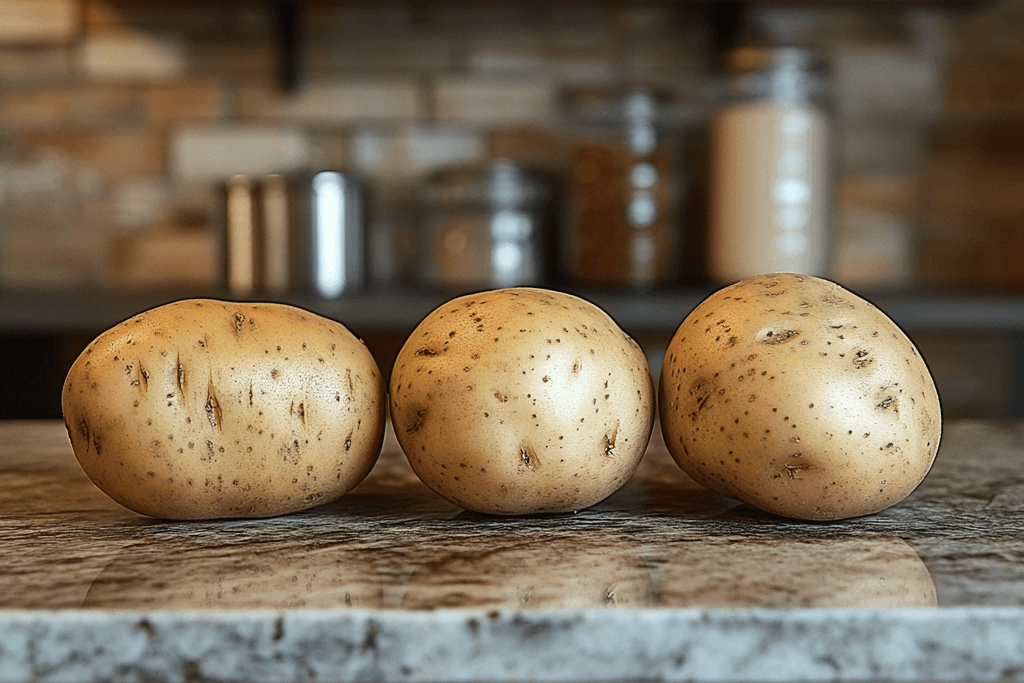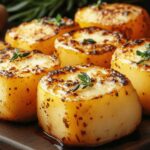Table of Contents
Russet potatoes are among the most popular varieties worldwide. They are known for their rough brown skin and starchy white flesh. These potatoes are a common choice for dishes like mashed potatoes, baked potatoes, and French fries. But many people wonder: how many calories do Russet potatoes actually contain? Are they a good option for those monitoring their calorie intake?
This article answers that question. We will explore the nutritional profile of Russet potatoes and how different cooking methods affect their calorie content. We’ll also discuss their potential health benefits. Additionally, we’ll explain how Russet potatoes can fit into a balanced diet and impact your overall calorie intake. Whether you’re a potato enthusiast or someone looking to make healthier food choices, this guide will provide all the key information you need.
Nutritional Value of Russet Potatoes
Russet potatoes, while often associated with being calorie-dense, are packed with nutrients that contribute to a healthy, balanced diet. Let’s break down the nutritional content of a typical Russet potato:
- Calories: A medium-sized Russet potato (approximately 150 grams) contains roughly 160-170 calories. This calorie count makes it a starchy vegetable, which can be part of a balanced diet, but it’s important to consume it in moderation if you are trying to manage your calorie intake.
- Carbohydrates: One of the most prominent macronutrients in Russet potatoes is carbohydrates. A medium-sized Russet contains around 37 grams of carbohydrates, which provides the body with a good source of energy, particularly important for individuals who engage in physical activities.
- Protein: Though potatoes aren’t typically a high-protein food, Russets offer about 4 grams of protein per medium-sized potato. This makes them a decent plant-based protein source when included in a diverse diet.
- Fat: Russet potatoes are naturally low in fat, with only about 0.2 grams of fat per medium-sized potato. This low-fat content makes them a heart-healthy option, particularly when compared to other starchy foods that may be higher in unhealthy fats.
- Fiber: One of the nutritional highlights of Russet potatoes is their fiber content. With about 4 grams of fiber per medium potato, they contribute significantly to digestive health and can help promote feelings of fullness, aiding in weight management.
- Vitamins and Minerals: In addition to macronutrients, Russet potatoes provide essential vitamins and minerals. They are a good source of Vitamin C, which boosts the immune system, and potassium, which is vital for heart health and muscle function. A medium Russet potato can contain about 620 milligrams of potassium, roughly 15% of your daily recommended intake.
To learn more about precise calorie counts, check out how many calories are in 1 Russet potato.
Calories in a Medium Russet Potato
Understanding how many calories are in a serving of Russet potatoes is crucial, especially when planning your meals. A medium-sized Russet potato, weighing around 150 grams (roughly 5.3 ounces), contains approximately 160-170 calories.The calorie content can vary slightly depending on the size and variety. However, it remains generally consistent for most Russet potatoes.

Here’s a breakdown of calories in different types of preparations:
- Baked Russet Potato: A plain, medium-sized baked Russet potato typically contains 160 calories. This is the basic calorie count for potatoes prepared without any added toppings.
- Boiled Russet Potato: If you opt for boiling, the calorie count is slightly lower, with a medium-sized boiled Russet potato containing about 130 calories (without any butter or seasoning).
- Fried Russet Potato (French fries): Frying Russet potatoes significantly increases the calorie count due to the oil absorbed during cooking. A serving of French fries made from Russet potatoes can have anywhere between 250 to 400 calories or more, depending on the portion size and oil used.
If you’re aiming to reduce your calorie intake, boiling or baking Russet potatoes without heavy toppings or oil is your best option.
How Cooking Methods Affect Calorie Count
The way you cook your Russet potatoes can have a significant impact on their overall calorie count. Let’s take a look at how different cooking methods affect the nutritional profile:
- Baked Russet Potatoes: Baking Russet potatoes is one of the healthiest methods to cook them. A medium baked potato (without any butter or toppings) contains around 160 calories. However, adding butter, sour cream, cheese, or other rich toppings can quickly increase the calorie count.
- Boiled Russet Potatoes: Boiling Russet potatoes is another healthy cooking method that retains most of their nutrients. A boiled medium-sized Russet potato contains about 130 calories, making it one of the lowest-calorie options if you prefer a simpler preparation. Compare this to other starchy foods by exploring calories in 100g of cooked Russet potato.
- Mashed Russet Potatoes: When mashed, Russet potatoes often have additional ingredients like butter, milk, or cream. A cup of mashed Russet potatoes can have up to 200-250 calories, depending on the quantity and ingredients used. If you’re making mashed potatoes at home, consider using lower-calorie options like low-fat milk or olive oil to keep the calorie count in check.
- Fried Russet Potatoes (French Fries): This is where the calorie count skyrockets. Fried potatoes absorb a lot of oil during the cooking process, significantly increasing the calorie content. A small serving of French fries can contain 300-400 calories or more, depending on the portion size and the method of frying. Deep frying typically results in higher calorie absorption than pan frying. Frying adds substantial calories, with one serving containing 300-400 calories depending on the portion and oil used. If you’re looking for healthier fried alternatives, you might find insights in low-calorie tortilla chips.
The healthiest cooking methods are baking, boiling, or roasting. Avoiding excessive oils or butter helps keep the calorie count manageable while preserving the nutritional benefits of Russet potatoes.
Health Benefits of Russet Potatoes
Russet potatoes are not just a source of calories—they also offer a variety of health benefits when consumed as part of a balanced diet. Here’s a closer look at the nutrients and advantages they provide:
- Rich in Potassium: Russet potatoes are an excellent source of potassium, an essential mineral that supports healthy blood pressure and proper muscle function. A medium-sized potato contains about 620 milligrams of potassium, which is about 15% of the daily recommended intake for adults.
- High in Fiber: With about 4 grams of dietary fiber per medium potato, Russet potatoes can help improve digestive health, regulate blood sugar levels, and promote satiety. Fiber also plays a key role in maintaining a healthy weight by making you feel fuller for longer.
- Good Source of Vitamin C: Russet potatoes contain a good amount of Vitamin C, an antioxidant that helps strengthen the immune system, promotes collagen production for healthy skin, and aids in the absorption of iron from plant-based foods.
- Gluten-Free: Russet potatoes are naturally gluten-free, making them an excellent choice for individuals with gluten sensitivities or celiac disease. You can enjoy them without worrying about gluten-related issues, as long as they are prepared in a gluten-free manner.
- Versatile and Affordable: One of the greatest advantages of Russet potatoes is their affordability and versatility. They can be used in a wide variety of dishes, from savory sides to main courses, while still offering substantial nutritional value without breaking the bank.
Russet potatoes can easily fit into a balanced diet and provide essential vitamins, minerals, and fiber, making them a worthwhile addition to your weekly meals. However, as with any food, it’s important to pay attention to portion sizes and cooking methods to maximize their health benefits. For more balanced meal ideas, consider pairing Russet potatoes with other nutrient-dense options like dense bean salads.
Common Myths About Russet Potatoes and Calories

There are several myths surrounding the calories and healthiness of Russet potatoes, often leading to confusion. Let’s debunk some of these misconceptions:
- Myth: Potatoes are too high in calories. Fact: Moderation is key. Learn more about their calorie impact in Russet potatoes calories.
- Myth: Eating potatoes leads to weight gain
Fact: Weight gain occurs when you consume more calories than you burn. Russet potatoes can be included in a healthy diet if eaten in moderation and prepared properly. It’s the extra ingredients (such as butter, cream, or excessive frying) that can lead to weight gain—not the potatoes themselves. - Myth: Potatoes are unhealthy because they are starchy
Fact: Potatoes are a starchy vegetable, but that doesn’t make them unhealthy. Starch is simply a form of carbohydrate that the body uses for energy. In fact, Russet potatoes are a good source of complex carbohydrates, which provide sustained energy throughout the day. - Myth: Potatoes cause blood sugar spikes
Fact: While it’s true that potatoes can cause a rise in blood sugar, the glycemic index (GI) of Russet potatoes can vary based on preparation methods. For example, boiled or baked potatoes generally have a lower GI than fried potatoes, which means they have less of an impact on blood sugar levels.
By addressing these myths, it’s clear that Russet potatoes, when eaten mindfully, can be a valuable part of a healthy diet. For more on maintaining a healthy diet, explore tips in 10 healthy dinner habits for a balanced life.
Frequently Asked Questions (FAQ)
How many calories are in 1 Russet potato?
A typical medium-sized Russet potato (about 150 grams or 5.3 ounces) contains approximately 160-170 calories. Learn more. This is the average calorie content for a plain, baked Russet potato without any added ingredients. The calorie count can vary slightly depending on the potato’s size, but it typically falls within this range.
How many calories are in 100g of cooked Russet potato?
For a cooked Russet potato, 100 grams contains around 87-90 calories, depending on the preparation method. This value can fluctuate slightly based on how the potato is cooked (boiled, baked, mashed, etc.). It’s important to note that adding ingredients like butter or oil during cooking will increase the calorie count significantly.
How many calories are in 200g of Russet potatoes?
A 200-gram serving of Russet potatoes typically contains 174-180 calories if baked or boiled without additional fat. This is approximately double the calories of a medium-sized Russet potato, which is around 160-170 calories. The calorie content will increase if you fry the potatoes or add high-calorie toppings.
How much potatoes is 200 calories?
To consume 200 calories from Russet potatoes, you would need approximately 1.2 medium-sized Russet potatoes (around 200-220 grams). This portion size may vary slightly based on the cooking method. For example, baked potatoes without added toppings are lower in calories compared to fried ones, so always consider the cooking method when calculating portions.
What do 500 calories of potatoes look like?
A serving of 500 calories from Russet potatoes would be roughly three medium-sized Russet potatoes (about 450-500 grams). This quantity would be large enough to serve as a substantial portion in a meal, but it’s important to account for the method of preparation. For instance, 500 calories of French fries (fried in oil) would typically be a smaller volume due to the added oil, while 500 calories of boiled or baked potatoes would result in a larger portion.
How many calories are in 1 potato?
The calorie content of 1 potato depends on its size and preparation. A small Russet potato (around 100 grams) contains about 90-100 calories. A medium Russet potato (150 grams) has 160-170 calories, and a large Russet potato (200 grams) contains approximately 210-220 calories. The way the potato is cooked (baked, boiled, mashed, or fried) will also influence the calorie count.
Russet potatoes are a versatile and nutritious food that can be a part of a healthy, balanced diet. Despite their reputation for being high in calories, they offer a wide range of health benefits, from providing essential vitamins like Vitamin C to being an excellent source of potassium and fiber. The calorie content of Russet potatoes can vary depending on their size and preparation method, but when cooked in a healthy way—such as baking, boiling, or roasting—they can fit into a calorie-conscious diet without issue.
Whether you’re looking to enjoy a medium-sized baked Russet potato for a light meal, or experimenting with mashed potatoes or homemade French fries, it’s important to consider the cooking method and portion sizes to keep the calorie count in check. By choosing healthier preparation methods, such as boiling or baking without excessive toppings or frying, you can enjoy the full nutritional benefits of Russet potatoes while keeping your calorie intake under control.
Russet potatoes, when prepared mindfully, are a versatile and nutritious food that fits into a balanced diet. Choose healthier methods like baking or boiling and pair them with nutrient-dense sides like salads for a wholesome meal. Want to dive deeper? Check out our guide on Russet potatoes’ calories and nutrition for more tips.
Perfect Baked Russet Potatoes
Equipment
- Baking Sheet
- Fork
- Oven
Ingredients
Potatoes
- 2 large Russet potatoes
- 1 tbsp olive oil
- 1/2 tsp salt
- 1/4 tsp black pepper
- 1/2 tsp garlic powder
- 1/2 tsp paprika
Instructions
- Preheat oven to 425°F (220°C).
- Scrub the Russet potatoes under running water and pat dry.
- Poke holes all over the potatoes with a fork to release steam.
- Rub each potato with olive oil, then sprinkle with salt, pepper, garlic powder, and paprika.
- Place the potatoes on a baking sheet and bake for 45-50 minutes, or until fork-tender.
- Remove from the oven, let cool for a few minutes, then slice open and serve with your favorite toppings!


